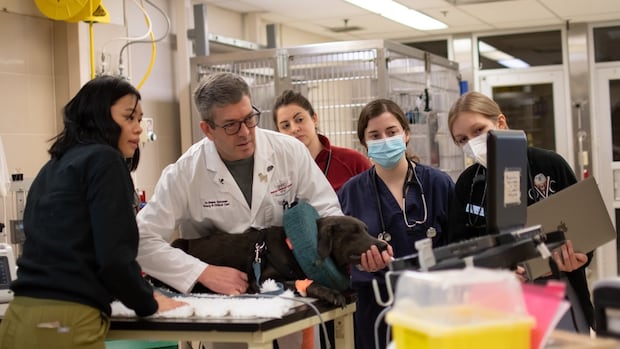New programming at the University of Guelph’s Ontario Veterinary College (OVC) is preparing students for situations that many people may not associate with animal medical specialists.
The OVC, Canada’s oldest veterinary college, began rolling out a new forensic science program this month. It’s offered in week-long rotations as an elective to fourth-year students, who learn how to identify when an animal has been abused or neglected.
Dr. Shane Bateman, an OVC professor in emergency and critical care medicine, said the forensic program involves taking the skills veterinarians already have — including anatomy, pathology and animal behaviour — and using them to spot possible abuse or neglect.
“The estimate is around 90 per cent of veterinarians will likely have seen what they perceive to be a case of animal cruelty or neglect with their practice lifetimes,” Bateman said.
He said some veterinarians haven’t had the tools to identify and report abuse or neglect, making them hesitant to follow through.
“What’s strongly motivating me to bring this education into our curriculum is to change the outcome from the research that shows that veterinarians aren’t necessarily always that good at reporting their suspicions.”
For Bateman, one of the most important lessons is that “our patients don’t speak. We can’t ask them what’s happened to them. So we rely very much on what a client is telling us.”
He said up to 90 per cent of vets will encounter a case of cruelty or neglect in their careers, but many hesitate to report it.
“The training that we’re providing is hopefully providing more confidence, more knowledge, more techniques, more skills for students to rely upon,” Bateman said.
Crimes against animals are supposed to be reported to Provincial Animal Welfare Services (PAWS), which then investigates and follows up with veterinarians.
PAWS, a government agency under the Ontario Ministry of the Solicitor General, declined to be interviewed for this article.
OSPCA, student reacts
Dr. Jill Kirk, chief veterinary officer for the Ontario SPCA and Humane Society, told CBC News that this training should be essential.
“If you’re just, you know, doing your routine exam, you might miss some signs that might raise a red flag or two. If you have the training, that will show you exactly what to look for.”
Kirk has a certificate in forensic veterinary sciences from the University of Florida. She said she’s had to use her training several times over her career.
“It’s up to veterinarians like me who work in humane societies where animals get surrendered, but it’s also up to the general private practitioner, just for them to know what signs to look for, to say, ‘Hey, something’s not right here.’
“It’s not our job as veterinarians to prove that abuse or neglect exists. It’s our job to report it.”

Founded in Toronto in 1862, the OVC moved to Guelph in 1922. It ranks as the top veterinary college in the country and is in the sixth spot internationally, according to the higher education analytics firm QS.
The school offers two four-year undergraduate programs — doctor of veterinary medicine and biomedical sciences for future veterinarians — as well as graduate programs.
Fourth-year veterinary student Diana Fitzgerald chose the forensic rotation as an elective, drawn by her interest in animal welfare.
“It feels like it goes hand in hand with the forensic sciences,” she said. “You can tell so much about the past affective states an animal may have gone through by focusing in on forensic work.”
Fitzgerald said it’s been “a very valuable experience split between classroom learning and the crime scene investigation.”
Fitzgerald believes it will help her in practice.
“Now, having taken this rotation, I’ll feel better prepared if a case were to come to me that is giving off the signs of potential for neglect or abuse. I’ll be able to better recognize those who help the animal.”
For her, it’s also about gratitude.
“There’s not too many educational institutions that offer learning experiences like this,” she said. “We all feel so grateful to learn from somebody so knowledgeable.”
Bateman hopes that sentiment will carry forward into the profession.
“Veterinarians are well educated. We know a lot about animal welfare, we know a lot about animal behaviour, we know a lot about the human animal bond,” he said.
“What we need to focus on is how do we close that gap? How do we give veterinarians the confidence and skills to be able to follow through on their instincts when they think that there’s something that’s not quite right?”
In other words, Bateman wants to make sure that when animals can’t speak for themselves, someone is ready to speak for them.
The Morning Edition – K-WOntario Veterinary College rolls out new forensic program
A brand new program is coming to the Ontario Veterinary College this year. It’s called forensic veterinary science. It’s designed to help future vets identify and report animal abuse or neglect. Program director Dr. Shane Bateman talks about why these skills are so important.







